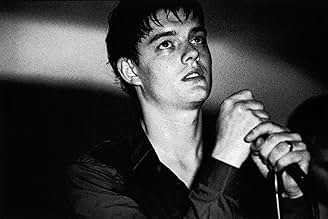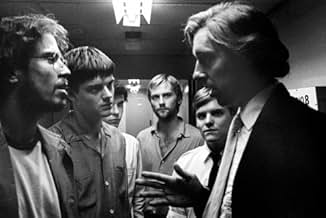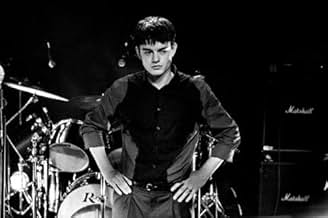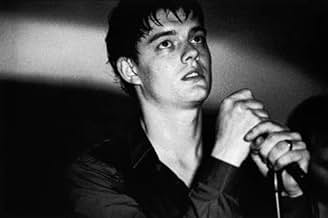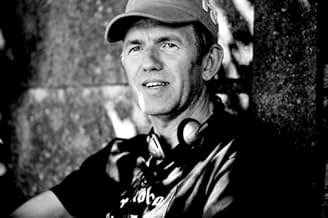IMDb रेटिंग
7.6/10
70 हज़ार
आपकी रेटिंग
व्यक्तिगत, पेशेवर और रूमानी परेशानियों से झुंझते हुए तेईस साल की उम्र में आत्महत्या करने वाले जॉय डिवीजन के बहुमुखी गायक, इयान कर्टिस के चरित्र वर्णन को पेश किया गया है.व्यक्तिगत, पेशेवर और रूमानी परेशानियों से झुंझते हुए तेईस साल की उम्र में आत्महत्या करने वाले जॉय डिवीजन के बहुमुखी गायक, इयान कर्टिस के चरित्र वर्णन को पेश किया गया है.व्यक्तिगत, पेशेवर और रूमानी परेशानियों से झुंझते हुए तेईस साल की उम्र में आत्महत्या करने वाले जॉय डिवीजन के बहुमुखी गायक, इयान कर्टिस के चरित्र वर्णन को पेश किया गया है.
- 1 BAFTA अवार्ड जीते गए
- 31 जीत और कुल 36 नामांकन
Martha Myers Lowe
- Ian's Sister
- (as Martha Myers-Lowe)
Mary Jo Randle
- Debbie's Mother
- (as Mary-Jo Randle)
फ़ीचर्ड समीक्षाएं
For me personally writing a comment for Control has proved to be a very difficult thing, my love of the band Joy Division has stayed with me from the very first moment I listened to the Unknown Pleasures album back in 1979. I remember Ian Curtis's death like it was yesterday, and no matter how many years roll by, I still feel an immense sadness when listening to the bands poetic beauty. I was mightily relieved after reading Deborah Curtis's book Touching From A Distance, for I found it refreshingly honest, and certainly it helped people get in a bit deeper to just what a troubled young man Ian Curtis was. So here we are in 2008 and the film adaptation of that book has arrived with truly brilliant results.
I have found it hard to write a comment for it because I have to cast aside my biased love of the band, but hopefully I've managed to view it objectively with both my head and my heart. Control is a film about Ian Curtis, the lead singer of the band Joy Division, people expecting an in-depth film about the band will be a little disappointed because this is the story of their lead singer, a troubled young man who just couldn't face it anymore. Filmed in black & white to perfectly capture the essence of the man the film is about, director Anton Corbijn has stayed loyal to the source material and crafted a haunting piece of work that lingers long after the final credits roll.
We follow Ian Curtis from his humble music leanings in the early 70s, here he meets Deborah who is soon to become his wife, a married man at the age of 18. We watch him join a group of Manchester lads at a Sex Pistols concert, it is here that the roots of Joy Division are formed. Then it's on to the formation of Factory records and the influential Svengali Tony Wilson. As the band start to make waves Ian Curtis becomes ill with epilepsy, and it's here that Corbijn crucially shows that the doctors involved really didn't have a clue how to treat him properly, trial and error with cocktails of drugs indeed.
Deborah and Ian become parents to Natalie, but Ian is away on the road for many days and nights, and it's here that he yearns for love from another quarter, and it's here that his infidelity will hang heavy on his already sunken shoulders. The band are set to make it big, their manager announces that they are about to tour America for the first time, this only adds another fraught string to Ian's already fractured bow, the pressure of fame a lethal bedfellow with Messrs epilepsy and infidelity, and then? I can't praise the work on this film enough, Sam Riley {relatively unknown outside of his hometown of Leeds} is simply brilliant as Curtis, dragging the viewer in completely on this desperately sad journey. Samantha Morton as Deborah is immense, she nails the emotional see-saw role with professional aplomb, and I would also like to raise a glass for the performance of the criminally undervalued Toby Kebbell (Dead Man's Shoes, Wilderness) his turn as Joy Division's manager Rob Gretton is down pat. Director Corbijn clearly had love for the project, and thankfully he was sensible enough to not over do the sentimental aspect of the troubled star. What Corbijn has done is perfectly frame the bleaker side of the story with old terraced houses and monstrous looking high rise's, they scream out as dank and dreary statements in black & white, yet they are overlooked by rolling hills to serve as a reminder when Curtis was at his happiest during the courtship with Deborah. Some scenes are unforgettable, such is the power of the emotion on offer, look out for the stunning appearance of heart tugging song Love Will Tear Us Apart, a crucial and poignant scene, and of course the film's tragic outcome hits like a sledgehammer. To which I thank Corbijn for giving us a very tasteful conclusion to this sad sad story.
So there it is, was I biased? I like to think I wasn't because I honestly feel that one doesn't have to be a fan of the band to get much from this movie. The film has won many awards, and I'm happy to report that Control has brought renewed interest in the beautiful/haunting work of one of England's greatest ever bands. Remastered CDs, reissued books, and even T-shirts are selling well in the shops as I type.
Control is a very sobering experience for fans and newcomers alike. 10/10
RIP Ian Curtis, you are very much missed.
I have found it hard to write a comment for it because I have to cast aside my biased love of the band, but hopefully I've managed to view it objectively with both my head and my heart. Control is a film about Ian Curtis, the lead singer of the band Joy Division, people expecting an in-depth film about the band will be a little disappointed because this is the story of their lead singer, a troubled young man who just couldn't face it anymore. Filmed in black & white to perfectly capture the essence of the man the film is about, director Anton Corbijn has stayed loyal to the source material and crafted a haunting piece of work that lingers long after the final credits roll.
We follow Ian Curtis from his humble music leanings in the early 70s, here he meets Deborah who is soon to become his wife, a married man at the age of 18. We watch him join a group of Manchester lads at a Sex Pistols concert, it is here that the roots of Joy Division are formed. Then it's on to the formation of Factory records and the influential Svengali Tony Wilson. As the band start to make waves Ian Curtis becomes ill with epilepsy, and it's here that Corbijn crucially shows that the doctors involved really didn't have a clue how to treat him properly, trial and error with cocktails of drugs indeed.
Deborah and Ian become parents to Natalie, but Ian is away on the road for many days and nights, and it's here that he yearns for love from another quarter, and it's here that his infidelity will hang heavy on his already sunken shoulders. The band are set to make it big, their manager announces that they are about to tour America for the first time, this only adds another fraught string to Ian's already fractured bow, the pressure of fame a lethal bedfellow with Messrs epilepsy and infidelity, and then? I can't praise the work on this film enough, Sam Riley {relatively unknown outside of his hometown of Leeds} is simply brilliant as Curtis, dragging the viewer in completely on this desperately sad journey. Samantha Morton as Deborah is immense, she nails the emotional see-saw role with professional aplomb, and I would also like to raise a glass for the performance of the criminally undervalued Toby Kebbell (Dead Man's Shoes, Wilderness) his turn as Joy Division's manager Rob Gretton is down pat. Director Corbijn clearly had love for the project, and thankfully he was sensible enough to not over do the sentimental aspect of the troubled star. What Corbijn has done is perfectly frame the bleaker side of the story with old terraced houses and monstrous looking high rise's, they scream out as dank and dreary statements in black & white, yet they are overlooked by rolling hills to serve as a reminder when Curtis was at his happiest during the courtship with Deborah. Some scenes are unforgettable, such is the power of the emotion on offer, look out for the stunning appearance of heart tugging song Love Will Tear Us Apart, a crucial and poignant scene, and of course the film's tragic outcome hits like a sledgehammer. To which I thank Corbijn for giving us a very tasteful conclusion to this sad sad story.
So there it is, was I biased? I like to think I wasn't because I honestly feel that one doesn't have to be a fan of the band to get much from this movie. The film has won many awards, and I'm happy to report that Control has brought renewed interest in the beautiful/haunting work of one of England's greatest ever bands. Remastered CDs, reissued books, and even T-shirts are selling well in the shops as I type.
Control is a very sobering experience for fans and newcomers alike. 10/10
RIP Ian Curtis, you are very much missed.
Control, a biopic about a band from Manchester, is getting serious attention from around the world. Starting with an award in Cannes. That's maybe more than you might expect. Joy Division, a respected band of the 70s, are hardly a name on everyone's lips. And films made by ex music video directors about yet another load of rockers rarely raise eyebrows. So why is this different? Joy Division, for non-initiates, were a post-punk Manchester band of throbbing guitars and dark, doom-laden lyrics. Recognition in the music biz (especially by other musicians) was perhaps even greater after the death of lead singer, Ian Curtis. Control covers a period from his schooldays to his end in 1980 (aged 23). It is based on the biography of his widow.
Control uses Curtis' love of poetry, as well as the more familiar songs-that-tell-a-story device, to provide at least scant insight into the music. "I wish I were a Warhol silkscreen, hanging on the wall," he muses. But what is dealt with in much more detail is his growing sense of isolation, coping with epilepsy as the pressures of touring build up, and the distraught domestic relations he is embroiled in with wife Debbie (Samantha Morton) and romantic-interest-from-afar Annik (Alexandra Maria Lara). "It's like it's not happening to me but someone pretending to be me. Someone dressed in my skin," he says.
In a telling scene when he is under hypnosis, the camera revolves around his head as we hear voices speaking to him. "Ian, let me in, love," says his wife, "there's room to talk." Responsibilities as husband and father. A mistress who is also in love with him. A band and fan following who want more than he can give. From warholian, carefree screen-dream of youth, he has arrived at a place where he doesn't want to be. Drugs and their side-effects no longer a schoolboy's recreational laugh. Prescription bottles grip with morbid fascination. And the knowledge that doctors don't have a cure.
The film carries viewers away with blistering intensity. Relative newcomer Sam Riley plays Curtis with alarming energy. With Samantha Morton, it's not what she says but what you see going through her mind. She contains her expressiveness for the camera to pick up (rather than thrusting it on us). We want to cry inside for her character. As a feat of interiorisation, Control puts her as a contender in the shoes of Meryl Streep.
Supporting cast members come through with believability and sincerity, sparkling with well-honed contrasts. Toby Kebbell, fast-talking manager Rob, lifts us out of the depressive mood with wisecracks enough to make legless monkeys jump. "Where's my £20?" asks a hapless stand-in as Rob deals with an emergency. "In my f*ck-off pocket!" he barks back. Craig Parkinson is record producer and late TV presenter Tony Wilson (to whom the opening screening at the Edinburgh International Film Festival was dedicated). He demonstrates fine shades of teeth-gritting tolerance, explaining to the band, seconds before their first live TV show: yes, 'large dog's c*ck' counts as swearing, and would mean the broadcast is pulled. Established Romanian actress, Alexandra Maria Lara, succeeds in making Annik far more than the two-dimensional bit-of-fluff that would have been an easy course. As potential home-breaker, it is tempting to hate her, yet her character is shown with the intellectual appreciation and chemistry that Debbie can no longer offer.
Morton, in the Q&A after the Edinburgh premiere, links the film to Saturday Night and Sunday Morning. It is the kitchen-sink, downtrodden existence that her Debbie inhabits. Cinematography is also reminiscent of this period, with its careful black-and-white observation of working class streets. I watched it a second time, enjoying careful compositions and suggestive mise-en-scene. But director Anton Corbijn is typically modest. "I really wanted you to look at the actors on the screen and only afterwards at the look of the film." While Ian, in Debbie's eyes, might be the licentious and 'angry young man' of social realism drama, the Control scenes from which she is tormentedly absent show another side: the world experienced by her husband (a reference in the film likens his isolation to Brando's character in Apocalypse Now).
"And we would go on as though nothing was wrong. And hide from these days we remained all alone."
Riley takes on manic expressions as if marching away from an impending epileptic fit while singing Transmission. It is such a potent, almost frightening feat, that we have to shake ourselves to remember he only got the part when he was stuck for a job. "Not a lot was going on in my life before this, so I was appreciative for the work and the money," he tells the opening night audience. "I imagine this will have opened doors for you," I had said to him earlier; he smiled like a man who still can't believe his good luck. But the 'luck' is very well deserved. His 'Ian' is physically and mentally complex. When I had managed to stop him on the Red Carpet long enough to congratulate him, Mr Riley explains that he had a friend who was an epileptic. "I witnessed an attack often enough to be able to copy it."
Although the film has a driving energy that takes our breath away, it drifts a little towards the tragic conclusion. We know the ending and it is a case of waiting for it to happen. And although it features plenty of excellent Joy Division tracks, any music biopic will never be good enough or accurate enough for some fans.
Fortunately this is not just for music fans but for serious film fans as well. It careers in a tightly controlled arc, where music biopic meets cinematic excellence. Why should you see it? "Some people visit the past for sentimental reasons," says Corbijn. "Some people visit the past to understand the present better." Control is not in the sentimental exercise category.
Control uses Curtis' love of poetry, as well as the more familiar songs-that-tell-a-story device, to provide at least scant insight into the music. "I wish I were a Warhol silkscreen, hanging on the wall," he muses. But what is dealt with in much more detail is his growing sense of isolation, coping with epilepsy as the pressures of touring build up, and the distraught domestic relations he is embroiled in with wife Debbie (Samantha Morton) and romantic-interest-from-afar Annik (Alexandra Maria Lara). "It's like it's not happening to me but someone pretending to be me. Someone dressed in my skin," he says.
In a telling scene when he is under hypnosis, the camera revolves around his head as we hear voices speaking to him. "Ian, let me in, love," says his wife, "there's room to talk." Responsibilities as husband and father. A mistress who is also in love with him. A band and fan following who want more than he can give. From warholian, carefree screen-dream of youth, he has arrived at a place where he doesn't want to be. Drugs and their side-effects no longer a schoolboy's recreational laugh. Prescription bottles grip with morbid fascination. And the knowledge that doctors don't have a cure.
The film carries viewers away with blistering intensity. Relative newcomer Sam Riley plays Curtis with alarming energy. With Samantha Morton, it's not what she says but what you see going through her mind. She contains her expressiveness for the camera to pick up (rather than thrusting it on us). We want to cry inside for her character. As a feat of interiorisation, Control puts her as a contender in the shoes of Meryl Streep.
Supporting cast members come through with believability and sincerity, sparkling with well-honed contrasts. Toby Kebbell, fast-talking manager Rob, lifts us out of the depressive mood with wisecracks enough to make legless monkeys jump. "Where's my £20?" asks a hapless stand-in as Rob deals with an emergency. "In my f*ck-off pocket!" he barks back. Craig Parkinson is record producer and late TV presenter Tony Wilson (to whom the opening screening at the Edinburgh International Film Festival was dedicated). He demonstrates fine shades of teeth-gritting tolerance, explaining to the band, seconds before their first live TV show: yes, 'large dog's c*ck' counts as swearing, and would mean the broadcast is pulled. Established Romanian actress, Alexandra Maria Lara, succeeds in making Annik far more than the two-dimensional bit-of-fluff that would have been an easy course. As potential home-breaker, it is tempting to hate her, yet her character is shown with the intellectual appreciation and chemistry that Debbie can no longer offer.
Morton, in the Q&A after the Edinburgh premiere, links the film to Saturday Night and Sunday Morning. It is the kitchen-sink, downtrodden existence that her Debbie inhabits. Cinematography is also reminiscent of this period, with its careful black-and-white observation of working class streets. I watched it a second time, enjoying careful compositions and suggestive mise-en-scene. But director Anton Corbijn is typically modest. "I really wanted you to look at the actors on the screen and only afterwards at the look of the film." While Ian, in Debbie's eyes, might be the licentious and 'angry young man' of social realism drama, the Control scenes from which she is tormentedly absent show another side: the world experienced by her husband (a reference in the film likens his isolation to Brando's character in Apocalypse Now).
"And we would go on as though nothing was wrong. And hide from these days we remained all alone."
Riley takes on manic expressions as if marching away from an impending epileptic fit while singing Transmission. It is such a potent, almost frightening feat, that we have to shake ourselves to remember he only got the part when he was stuck for a job. "Not a lot was going on in my life before this, so I was appreciative for the work and the money," he tells the opening night audience. "I imagine this will have opened doors for you," I had said to him earlier; he smiled like a man who still can't believe his good luck. But the 'luck' is very well deserved. His 'Ian' is physically and mentally complex. When I had managed to stop him on the Red Carpet long enough to congratulate him, Mr Riley explains that he had a friend who was an epileptic. "I witnessed an attack often enough to be able to copy it."
Although the film has a driving energy that takes our breath away, it drifts a little towards the tragic conclusion. We know the ending and it is a case of waiting for it to happen. And although it features plenty of excellent Joy Division tracks, any music biopic will never be good enough or accurate enough for some fans.
Fortunately this is not just for music fans but for serious film fans as well. It careers in a tightly controlled arc, where music biopic meets cinematic excellence. Why should you see it? "Some people visit the past for sentimental reasons," says Corbijn. "Some people visit the past to understand the present better." Control is not in the sentimental exercise category.
Control, the story of Ian Curtis, singer of British alternative band Joy Division. The film is made in black and white, which adds a certain edge to the film. There isn't much drama or fast-paced scenes (until the very end, I guess), and that seems to be what everyone criticizes about the movie. Why do you think the director wanted it black and white? If it had been a sincerely boring film, why release it?
Of course they made up some aspects of Ian's life, but the fact is that Ian was a dull, depressed human being. He couldn't handle love, or fame overall. He doesn't show signs of emotion in the film, and doesn't speak much at all. Truth is, black and white was exactly what he saw, while he was spiraling towards the end of his life.
The acting is incredible. Absolutely spot on. Very very noteworthy.
I enjoyed Control, but that's only because I love indie films and rock and roll movies. If you're looking into this movie expecting some delicious drama and edge-of-your-seat thrills, just don't watch it. It's about a man who gradually fell apart, who gradually lost control. And if you can't see that in the film, it's definitely not worth watching.
Of course they made up some aspects of Ian's life, but the fact is that Ian was a dull, depressed human being. He couldn't handle love, or fame overall. He doesn't show signs of emotion in the film, and doesn't speak much at all. Truth is, black and white was exactly what he saw, while he was spiraling towards the end of his life.
The acting is incredible. Absolutely spot on. Very very noteworthy.
I enjoyed Control, but that's only because I love indie films and rock and roll movies. If you're looking into this movie expecting some delicious drama and edge-of-your-seat thrills, just don't watch it. It's about a man who gradually fell apart, who gradually lost control. And if you can't see that in the film, it's definitely not worth watching.
Days away from embarking on a long dreamed about tour of the United States, Ian Curtis, the lead singer of the band Joy Division, hanged himself on May 23, 1980 from a rope in the kitchen of his apartment. His suicide not only ended his promising young life but also the dreams of a generation. Twenty seven years after his death, the eulogizing continues. Last year saw a documentary by Christian Davies: Joy Division: Under Review and this year has brought two more films: Joy Division: The Last True Story In Pop by Grant Gee and Control, the winner of the Camera d'Or at the Cannes Film Festival. Based on the 1996 memoir "Touching From a Distance" by Ian's widow Deborah Curtis, the film follows Curtis' life from his teenage years to his tragic death at age twenty three.
Unlike conventional bio-pics like Ray and Walk the Line with their star glamorizing propensities, Control delivers a three-dimensional portrait of a real human being and how his troubles affected the people closest to him. The film is directed by photographer and video director Anton Corbijn, a celebrated photographer who took some of the most recognized photos of Joy Division. Because he knew and worked with the band, the emotional connection to its subject is palpable. The film is shot in black and white and the choice underscores the grayness of Curtis' home town of Macclesfield, England and the grim mood of much of the work.
The major reason for the film's success, however, rests with lead actor Sam Riley who eerily recreates Curtis in appearance and voice. He performs all of the band's iconic songs such as Atmosphere, Love Will Tear Us Apart, and Twenty-Four Hours himself, using Curtis' robotic hand motions on stage to great effect. Another outstanding performance is that of Samantha Morton who plays Deborah Curtis, Ian's loving and patient wife who is overwhelmed by her husband's success and her new responsibilities as a mother of their daughter. Married at a very young age, both husband and wife lack the strength to make a go of it especially with the pressure of Curtis' epileptic seizures growing worse, and Ian's on again off again affair with Belgian journalist Annik (Alexandra Maria Lara).
Though the subject matter is melancholy, Matt Greenhalgh's script provides a light touch filled with trenchant one-liners from the group's manager Rob Gretton (Tony Kebbell) and witty remarks from band members Joe Anderson, James Anthony Pearson and Harry Treadaway. Although Curtis has become one of rock's most mythologized figures, Riley plays him simply as a very innocent, down to earth young man whose talent was much greater than his ability to handle it. Control is an extremely moving experience whether or not you have foreknowledge of the events of Curtis' life. It is a film that has the power to touch and leave memories that are indelible.
Unlike conventional bio-pics like Ray and Walk the Line with their star glamorizing propensities, Control delivers a three-dimensional portrait of a real human being and how his troubles affected the people closest to him. The film is directed by photographer and video director Anton Corbijn, a celebrated photographer who took some of the most recognized photos of Joy Division. Because he knew and worked with the band, the emotional connection to its subject is palpable. The film is shot in black and white and the choice underscores the grayness of Curtis' home town of Macclesfield, England and the grim mood of much of the work.
The major reason for the film's success, however, rests with lead actor Sam Riley who eerily recreates Curtis in appearance and voice. He performs all of the band's iconic songs such as Atmosphere, Love Will Tear Us Apart, and Twenty-Four Hours himself, using Curtis' robotic hand motions on stage to great effect. Another outstanding performance is that of Samantha Morton who plays Deborah Curtis, Ian's loving and patient wife who is overwhelmed by her husband's success and her new responsibilities as a mother of their daughter. Married at a very young age, both husband and wife lack the strength to make a go of it especially with the pressure of Curtis' epileptic seizures growing worse, and Ian's on again off again affair with Belgian journalist Annik (Alexandra Maria Lara).
Though the subject matter is melancholy, Matt Greenhalgh's script provides a light touch filled with trenchant one-liners from the group's manager Rob Gretton (Tony Kebbell) and witty remarks from band members Joe Anderson, James Anthony Pearson and Harry Treadaway. Although Curtis has become one of rock's most mythologized figures, Riley plays him simply as a very innocent, down to earth young man whose talent was much greater than his ability to handle it. Control is an extremely moving experience whether or not you have foreknowledge of the events of Curtis' life. It is a film that has the power to touch and leave memories that are indelible.
Ian Curtis had suffered more than any man should. Like most depressives, he was difficult to be understood by those around him. A teenager living in a Manchester suburbia turned post-punk rocker--lead singer/songwriter for the now infamous Joy Division--married at a young age, father to a child and dead by hanging at 23.
Despite "Control" being made by the stunning music video director and photographer Anton Corbijn, and inspired by the memoir "Touching From a Distance" who was written by his widow Debbie--who also found the body--there is a feeling of distance and isolation to the character. Perhaps his way of keeping people aside was his greatest legacy. Alienation and mystery elevated to an art form without him even trying.
Pretty-boy newcomer Sam Riley also portrays him in a very passive way. His performance might seem effortless, but there is a subdued discipline involved. He is economic with words, the entire movie seemingly happening around him almost independently of whatever he was doing--and let's not forget he is the main character. I am tempted to praise Corbijn for this touch but I feel it came natural given Curtis' absentee nature.
But let's just make this clear--his character is not underdeveloped--on the contrary, Corbijn and Riley fully embrace the enigma of a man who, as this movie efficiently showed us--was not that complicated. He married young, like any teenager swooped by adolescent love. So, it was not surprising when he fell for a Belgian journalist who came to interview the band. Annik Honore (Alexandra Maria Lara) is only there to be his mistress. But she doesn't need to be anything more. Curtis had one of those rare qualities you find in people that they can impress simply by being in your presence--an aura of fascination personified again brilliantly in Riley's subdued discipline.
Love tore him apart. He loved both Debbie and Annik. His inability to choose might've been due to his young age yet due to his depressive nature he gave away an illusion of wisdom beyond his years. Don't get me wrong--the man was a genius. Too smart for his own good, yet he pushed life too far and too fast and soon enough life pushed back. In one particular scene, Annik asked him what everyone was wondering: "I don't feel like I know you". She then proceeded to ask him what his favorite movie was to which he responded with "The Sound of Music" to her surprise--not to mine, though. It was so apparent that Curtis did not care for the rock'n'roll life. He was a simple man who loved music so of course that movie would seem appropriate. He hated playing for the people, debauchery bored him and his "epilepsy dance" wasn't as much of a rock statement as it was him embracing the aforementioned condition of which he suffered heavily from in confusion.
In the end, I must confess that Joy Division was a band I respected more than I actually loved. Their first album was good and a great introduction to rock's potential of catharsis and introspection, yet I loved their second one more. In both, though, Curtis manifested pieces of himself through minimalistic lyrics and his tragic suicide only serves to accelerate their and the band's legendary status.
Despite "Control" being made by the stunning music video director and photographer Anton Corbijn, and inspired by the memoir "Touching From a Distance" who was written by his widow Debbie--who also found the body--there is a feeling of distance and isolation to the character. Perhaps his way of keeping people aside was his greatest legacy. Alienation and mystery elevated to an art form without him even trying.
Pretty-boy newcomer Sam Riley also portrays him in a very passive way. His performance might seem effortless, but there is a subdued discipline involved. He is economic with words, the entire movie seemingly happening around him almost independently of whatever he was doing--and let's not forget he is the main character. I am tempted to praise Corbijn for this touch but I feel it came natural given Curtis' absentee nature.
But let's just make this clear--his character is not underdeveloped--on the contrary, Corbijn and Riley fully embrace the enigma of a man who, as this movie efficiently showed us--was not that complicated. He married young, like any teenager swooped by adolescent love. So, it was not surprising when he fell for a Belgian journalist who came to interview the band. Annik Honore (Alexandra Maria Lara) is only there to be his mistress. But she doesn't need to be anything more. Curtis had one of those rare qualities you find in people that they can impress simply by being in your presence--an aura of fascination personified again brilliantly in Riley's subdued discipline.
Love tore him apart. He loved both Debbie and Annik. His inability to choose might've been due to his young age yet due to his depressive nature he gave away an illusion of wisdom beyond his years. Don't get me wrong--the man was a genius. Too smart for his own good, yet he pushed life too far and too fast and soon enough life pushed back. In one particular scene, Annik asked him what everyone was wondering: "I don't feel like I know you". She then proceeded to ask him what his favorite movie was to which he responded with "The Sound of Music" to her surprise--not to mine, though. It was so apparent that Curtis did not care for the rock'n'roll life. He was a simple man who loved music so of course that movie would seem appropriate. He hated playing for the people, debauchery bored him and his "epilepsy dance" wasn't as much of a rock statement as it was him embracing the aforementioned condition of which he suffered heavily from in confusion.
In the end, I must confess that Joy Division was a band I respected more than I actually loved. Their first album was good and a great introduction to rock's potential of catharsis and introspection, yet I loved their second one more. In both, though, Curtis manifested pieces of himself through minimalistic lyrics and his tragic suicide only serves to accelerate their and the band's legendary status.
क्या आपको पता है
- ट्रिवियाThe actors playing Joy Division learned how to play the songs themselves. So the scenes where the band is playing live is not from tape, but actually the actors playing live.
- गूफ़Joy Division is shown performing "Transmission" on Tony Wilson's television show in September 1978, but in reality, they performed "Shadowplay". The performance that is represented in this scene actually took place a year later in September 1979 on the BBC2 program "Something Else", when they performed "Transmission" (a performance which was used as the music video for the song) and "She's Lost Control".
- भाव
Ian Curtis: Existence. Well, what does it matter? I exist on the best terms I can. The past is now part of my future. The present is well out of hand.
- क्रेज़ी क्रेडिटSPOILER: Epilogue: "Ian Curtis died May 18, 1980. He was 23 years old."
- साउंडट्रैकDrive-In Saturday
(David Bowie)
Published by kind permission of Tintoretto Music/RZO Music Ltd/EMI Music Publishing Ltd/Chrysalis Music Ltd © 1973
Performed by David Bowie
Courtesy of RZO Music
टॉप पसंद
रेटिंग देने के लिए साइन-इन करें और वैयक्तिकृत सुझावों के लिए वॉचलिस्ट करें
विवरण
- रिलीज़ की तारीख़
- कंट्री ऑफ़ ओरिजिन
- आधिकारिक साइट
- भाषा
- इस रूप में भी जाना जाता है
- Контроль
- फ़िल्माने की जगहें
- उत्पादन कंपनियां
- IMDbPro पर और कंपनी क्रेडिट देखें
बॉक्स ऑफ़िस
- बजट
- €45,00,000(अनुमानित)
- US और कनाडा में सकल
- $8,72,252
- US और कनाडा में पहले सप्ताह में कुल कमाई
- $27,674
- 14 अक्टू॰ 2007
- दुनिया भर में सकल
- $81,59,996
- चलने की अवधि2 घंटे 2 मिनट
- रंग
- ध्वनि मिश्रण
- पक्ष अनुपात
- 2.35 : 1
इस पेज में योगदान दें
किसी बदलाव का सुझाव दें या अनुपलब्ध कॉन्टेंट जोड़ें






